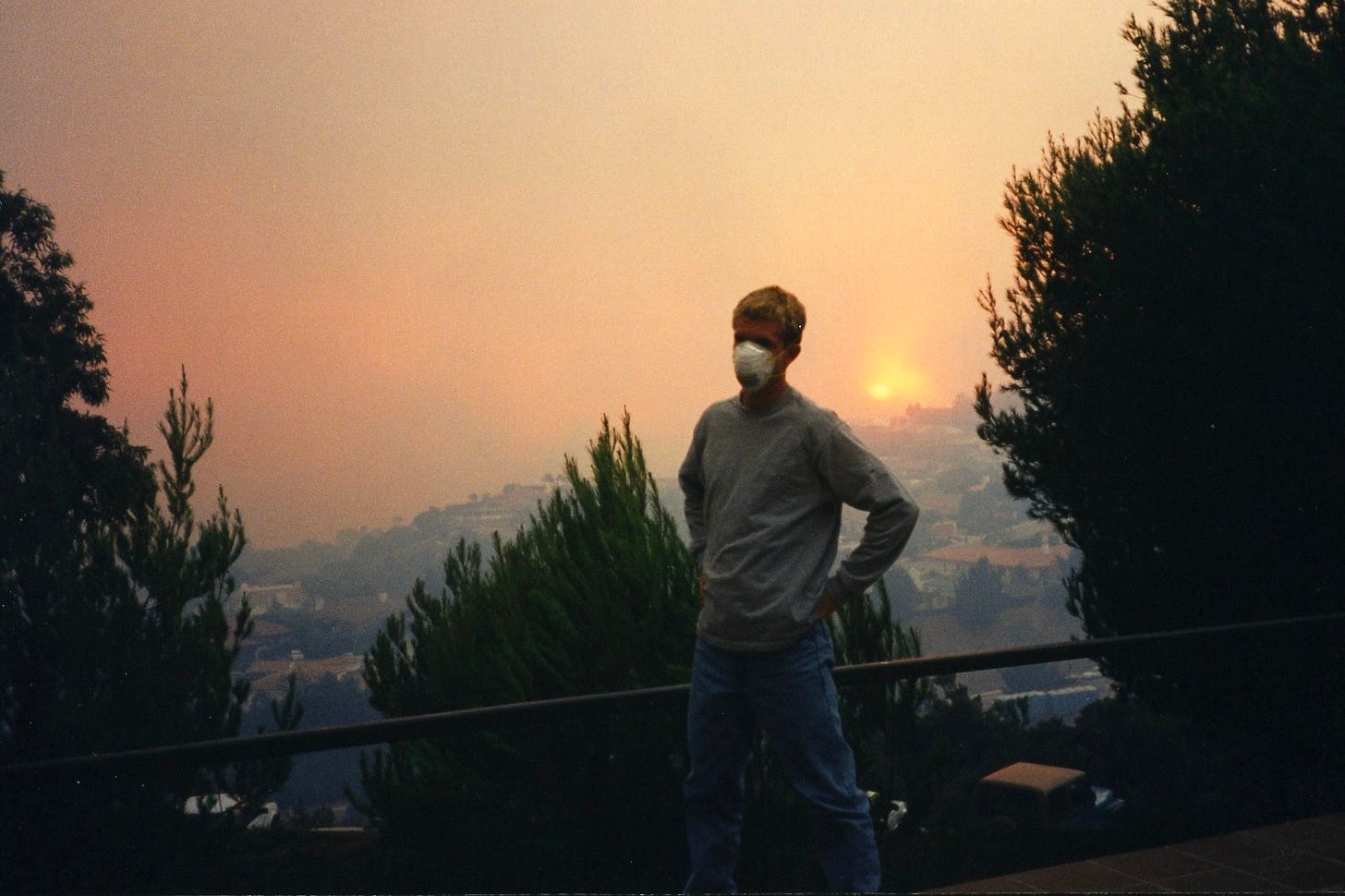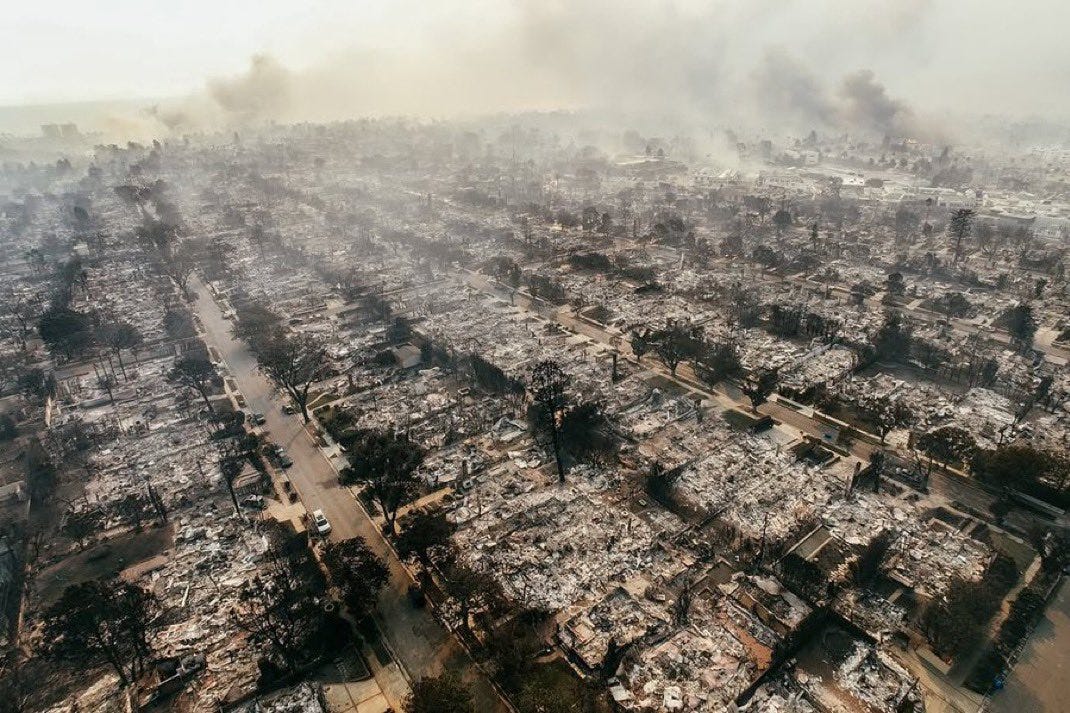LA is (still) burning, and I am inadequate to the need
Six days of Los Angeles fires, and how I'm doing.
First things first: we’re safe.
There are two significant fires in Los Angeles. Both of them more catastrophic than fires in recent years.
The Palisades and Eaton fires started just one week ago, and are still going. As I write this, neither one is more than 20% contained.
I literally just got an alert about “two more days” of intense winds. We’re not yet through this.
Like most people living through a regional natural disaster — hurricanes, fires, earthquakes — I’ve been the lucky recipient of calls and texts from far-away friends and relatives.
When the tables are turned, however, I often worry that a call or text is insufficient in the face of such tragedy.
“Maybe this is a distraction.”
“Do they want to get another message about this?”
“Do they want to hear from someone who isn’t going through this?”
When you feel like others want to hear from you less than you want to reach out, then you don’t.
I just listened to a conversation about this exact dynamic in a recent episode of Derek Thompson’s podcast Plain English. He discusses a scientific study called Mistakenly Seeking Solitude in which Chicago commuters were nudged into talking to strangers on the morning train.
“When we just asked them to imagine having a conversation, they actually thought it would feel pretty good. The barrier was they didn't think other people wanted to talk to them.
[T]hey thought that that person is less interested in talking to me than I am in talking to them. They were pessimistic about how this person would respond.
And notice, if everybody on the train has just a little bit of that, and that difference can even be small, I'm a little more interested in talking to you than you are to me, what percentage of people are going to reach out and talk?
Zero is the answer. Zero.”
More on this below, but if you have an hour, listen to the whole thing. It’s so good:
Why is this fire so unique?
I’ve lived in Los Angeles almost 30 years.
In October 1996 — just months into my freshman year at Pepperdine — there was a huge fire around Malibu and even on campus. All the students gathered in the cafeteria for safety.
Look, an N95 mask before anyone even knew what that was!
In the decades since, there’s been a significant fire around Los Angeles every few years.
And yet, I can probably only name three or four people — who I personally know — whose homes were destroyed.
These were mostly rural homes, surrounded by sagebrush and lots of land.
But this fire?
See this widely-shared photo of the Pacific Palisades, just one day after the fire started.
See this video my friend shot as he drove arond at 4PM on Tuesday (just ~6 hours after it started).
See this video my wife took from the bluffs above Culver City on Wednesday morning (~22 hours after the fire started).
The devastation is deep. And widespread.
Katie and I sat at our dining room table yesterday at 10AM, for a live-Zoom church service. It was like a flashback to COVID church in 2020.
Our church’s building is just a mile away from the affected area, and while the building is safe, many of our members live in the Palisades.
One of our pastors read the names of people affected — people who have lost homes, businesses, everything.
The reading went on for MINUTES.
37 names of people and families.
In the Zoom chat, dozens of additional names were added.
At last count, I personally know a dozen people who have lost homes.
That’s the difference this time.
Inadequate to the Need
During the past week, I’ve had the pang of “survivors guilt.” And not knowing what to do to help. I’ve given some money here and there.
The worst my family has experienced has been two days off school for “poor air quality.”
My mom had a moment where she might need to evacuate due to a secondary fire near her home, but that was quickly handled.
We had to console my kids. Espeically the older ones who now have Apple Watches and therefore now get all the evacuation alerts (which were mistakenly sent to everyone in LA county, rather than just the affected area).
But overall, I’ve been in my hesitant mindset.
“Do people want to hear from me?”
In this state, I was invited to join a small lunch yesterday afternoon — our pastor at church opened up his home to host families who had lost everything.
And I went.
As I drove there, I worried about not having the right things to say (or not say!).
I was nervous because I hadn’t suffered.
But I thought, “at least I can hear their stories.” I knew there might be catharsis and hearing the harrowing escapes and intimate details of these peoples’ past five days.
I was one of the first to arrive (because of course I was).
About twelve families showed up. Some with young kids, some older.
Some small talk.
Passed plates and drinks.
People racanted the same stories they had undoubtedly told friends and family members.
Then we sat in the living room, and each family went around the room and shared. Really shared.
Their emotions. Some hopeful. Some angry. Some fearful.
Some angry that they couldn’t get up to see what was happening, but looters not be contained.
Some worried about homeowners insurance that would cover the cost of the (eventual) rebuilt, but didn’t cover rental costs until then.
Couple after couple. Family after family, who had lost everything just days before.
A week earlier, everything was normal.
So many had stacked suffering — that the fire has compounded. Medical issues. Financial strain. Family struggles. Business challenges.
I heard fear about rental gauging — conversations about houses for rent in the area going up 300% or more.
I heard harrowing stories of an entire private elementary school evacuating.
I heard regrets from not taking enough time to gather more cherished memories before they left their home.
I heard the pain of having one of the only homes that didn’t burn on their street, and wondering what would happen next.
Above all, I simply heard discouragement about the community they had — the neighbors, the kids’ classmates, the cowokers — that wouldn’t regather for years, if ever.
Their close-knit community, scattered beyond repair.
I didn’t say much in that group setting. I had the feeling that whatever I might say wouldn’t be enough.
But as we wrapped up, so many of them simply said they were happy that I came to support them.
I felt, and still feel, inadequate to the need.
But I showed up. I made it clear that I wanted to talk with them — to be there in person, though it was hard, and even though I didn’t know what they wanted.
And that was enough.
I know many of you don’t live in this area, so it’s hard to understand what’s happening from afar. I’m mostly tied to the Palisades area, by proximity, so I wrote this so many of you can have a sense of what it’s like.
To anyone who is experiencing loss, I feel for you.
There are lots of places that need volunteers and money, so I’ll simply share this link to our church’s website. We’ve listed a collection of orgs that need help, and a fund that we’ve opened that will be distributed to people in the area who need it.
Here we go—
Alec









Thanks for writing this. I had a few notes drafted to people and decided not to send because— “they don’t need to hear from me right now!!” Narrative played in my head.
Reconsidering the messages and the send. Hope you continue to stay safe and praying for resolve in all its forms. 🙏
I appreciate the post. I've never lived in LA, but I love the city and it's heartbreaking to see the devastation unfolding there.